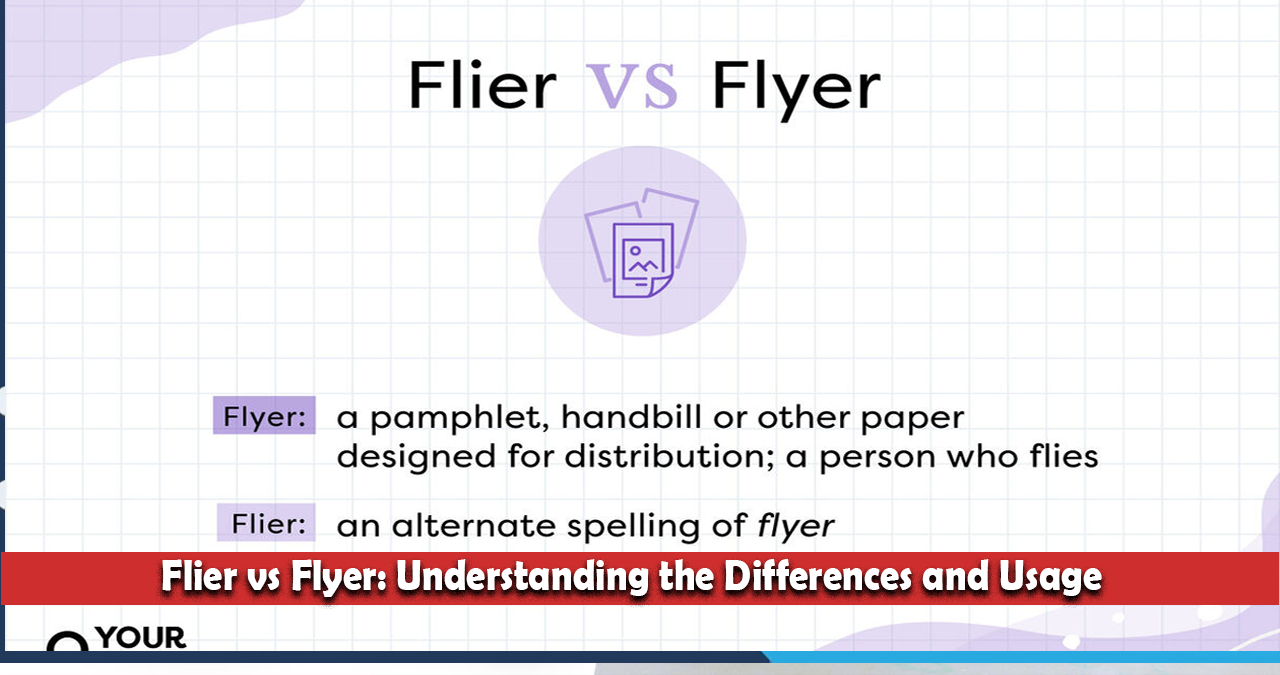Flier vs Flyer: When it comes to the English language, even the smallest variations in spelling can spark debates. One such pair of words that often causes confusion is “flier” and “flyer.” Are they interchangeable? Is one spelling more correct than the other? In this article, we’ll dive deep into the meanings, origins, and usage of these two terms, helping you understand when and how to use them correctly.
What is the Difference Between Flier and Flyer?
At first glance, “flier” and “flyer” seem like two sides of the same coin. Both words are nouns and share similar meanings, but their usage can vary depending on context, region, and style guides.
The primary difference lies in their spelling and regional preferences. “Flyer” is the older and more commonly used spelling, especially in British English. It is widely accepted in American English as well, particularly when referring to promotional materials or someone who flies frequently. On the other hand, “flier” is a variant spelling that is more common in American English and is sometimes preferred in specific contexts, such as aviation or idiomatic expressions.
Despite these nuances, both spellings are considered correct, and you can use them interchangeably in most cases. However, understanding their subtle differences can help you choose the right word for the right situation.
Flier vs Flyer: Definitions and Examples
1. A Person, Animal, or Thing That Flies
Both “flier” and “flyer” can refer to someone or something that flies. This includes pilots, passengers, birds, or even objects like paper airplanes.
- Examples:
- “The eagle is an excellent flyer, soaring high above the mountains.”
- “My grandfather was a flier during World War II, serving as a bomber pilot.”
- “This paper airplane is a surprisingly good flyer!”
In this context, the choice between “flier” and “flyer” often comes down to personal preference or regional norms. However, “flyer” is more commonly used when referring to frequent travelers, as in “frequent flyer programs.”
2. A Pamphlet or Handbill Used for Advertising
Another common meaning of both words is a printed piece of paper used for advertising or providing information. Whether you call it a “flier” or a “flyer,” it serves the same purpose.
- Examples:
- “The marketing team designed a colorful flyer to promote the new café.”
- “I picked up a flier for the upcoming art exhibition at the library.”
Here, “flyer” is the more widely accepted spelling, especially in American English. However, “flier” is also correct and can be used interchangeably.
3. Specialized Uses of “Flyer”
There’s one context where only “flyer” is used: in textiles. A flyer is a device that twists yarn and winds it onto a spindle or bobbin.
- Example:
- “The flyer on the spinning wheel ensures the yarn is evenly wound.”
In this case, “flier” is not an acceptable alternative.
Flier vs Flyer: Regional and Stylistic Preferences

While both spellings are correct, their usage often depends on regional preferences and style guides.
American English vs British English
- Flyer: This spelling is more common in British English and is widely accepted in American English. It’s the preferred choice for promotional materials and frequent traveler programs.
- Flier: This variant is more common in American English and is sometimes used in aviation contexts or idiomatic expressions like “take a flier” (meaning to take a risk).
Style Guides and Publications
Different style guides have their own preferences:
- AP Stylebook: Recommends “flyer” for most cases but allows “flier” in specific idiomatic expressions.
- Chicago Manual of Style: Does not state a preference, leaving it up to the writer.
- Guardian and Oxford Dictionaries: Prefer “flyer.”
- American Heritage College Dictionary: Favors “flier.”
When writing for a specific audience or publication, it’s best to follow their preferred style guide.
Flier vs Flyer: Slang and Idiomatic Expressions
Both words have found their way into slang and idiomatic expressions, adding another layer to their usage.
Using “Flier” in Slang
- Taking a Risk: “He decided to take a flier on the new startup, hoping it would pay off.”
- A Flying Jump: “She took a flier off the diving board, executing a perfect somersault.”
Using “Flyer” in Slang
- High Achiever: “She’s a real high flyer, having built her business from the ground up.”
These informal uses highlight the versatility of both spellings, though “flier” is more commonly used in risk-related expressions.
Tips for Choosing Between Flier and Flyer
- Consider Your Audience: If you’re writing for a British audience, “flyer” is the safer choice. For American audiences, both are acceptable, but “flyer” is more common for promotional materials.
- Follow Style Guides: Check the preferred spelling of the publication or organization you’re writing for.
- Be Consistent: Once you choose a spelling, stick with it throughout your document.
- Use “Flyer” for Textiles: Remember that only “flyer” is used in the context of spinning yarn.
Flier vs Flyer: Examples in Sentences
Using “Flyer”
- “The event flyer caught my eye with its vibrant colors and bold fonts.”
- “As a frequent flyer, she enjoys perks like free upgrades and lounge access.”
- “The spinning wheel’s flyer ensures the yarn is evenly twisted.”
Using “Flier”
- “He’s a seasoned flier, having logged thousands of hours in the cockpit.”
- “The flier advertised a 50% discount on all items this weekend.”
- “Taking a flier on that investment turned out to be a great decision.”
Flier vs Flyer: Common Questions Answered
Is “Flier” or “Flyer” Correct?
Both are correct! The choice depends on context, region, and style preferences.
Which Spelling is More Common?
“Flyer” is more commonly used, especially in British English and for promotional materials.
Can I Use Them Interchangeably?
Yes, in most cases. However, “flyer” is the only correct spelling in textile contexts.
Flier vs Flyer: A Quick Comparison
| Aspect | Flyer | Flier |
|---|---|---|
| Common Usage | Promotional materials, British English | Aviation, American English |
| Textile Context | Correct | Incorrect |
| Idiomatic Expressions | Less common | More common (e.g., “take a flier”) |
| Style Guide Preference | AP Stylebook, Oxford Dictionaries | American Heritage Dictionary |
Flier vs Flyer: Frequently Asked Questions (FAQs)
1. What is the origin of “flyer” and “flier”?
“Flyer” dates back to the 15th century and is the older spelling. “Flier” emerged later as a variant, particularly in American English.
2. Which spelling should I use for a marketing campaign?
“Flyer” is the more widely accepted spelling for promotional materials.
3. Is “flier” ever used in British English?
Rarely. British English strongly prefers “flyer.”
4. Can “flier” refer to a pilot?
Yes, both “flier” and “flyer” can refer to a pilot or passenger.
5. Why do some airlines use “frequent flyer” instead of “frequent flier”?
“Flyer” is the more common and widely accepted spelling for this context.
Conclusion
The debate between “flier” and “flyer” is a fascinating example of how language evolves and adapts. While both spellings are correct, understanding their subtle differences can help you communicate more effectively. Whether you’re designing a promotional flyer, writing about aviation, or discussing textiles, choosing the right spelling ensures clarity and professionalism.
So, the next time you’re unsure whether to use “flier” or “flyer,” remember this guide and fly (or flier) with confidence!
External Links
This article provides a detailed, engaging, and easy-to-understand explanation of “flier vs flyer,” ensuring it ranks well and resonates with readers.



